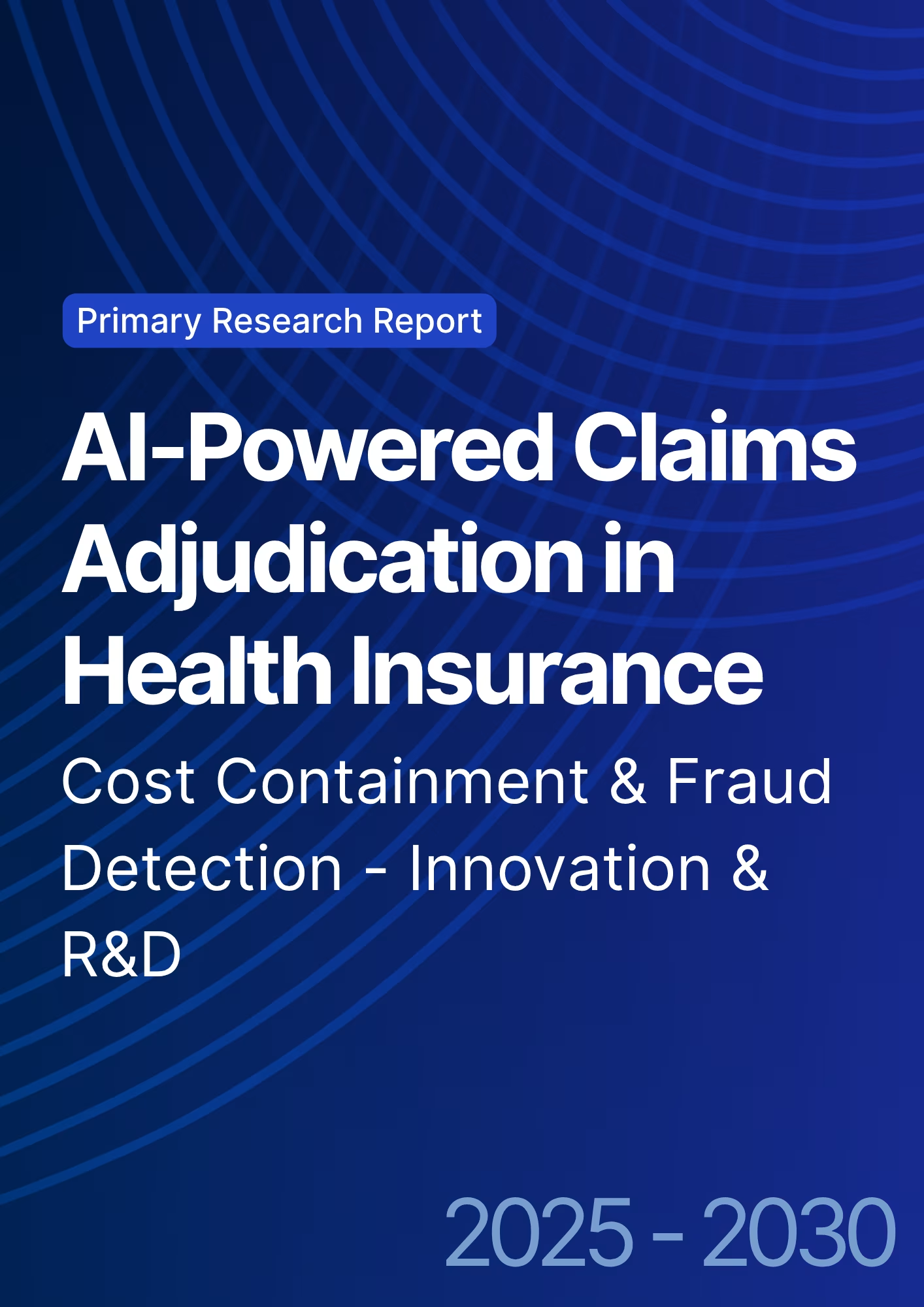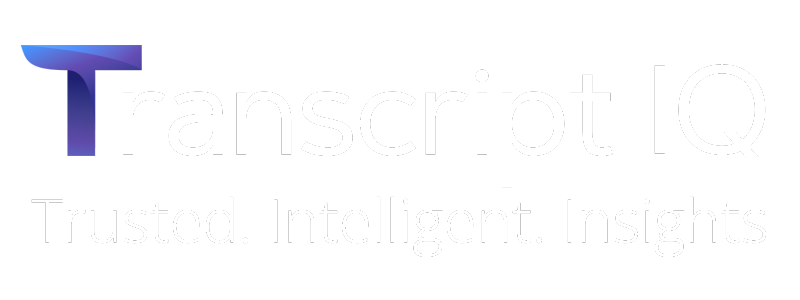

68 Circular Road, #02-01 049422, Singapore
Revenue Tower, Scbd, Jakarta 12190, Indonesia
4th Floor, Pinnacle Business Park, Andheri East, Mumbai, 400093
Cinnabar Hills, Embassy Golf Links Business Park, Bengaluru, Karnataka 560071
Connect With Us
AI-Powered Claims Adjudication in Health Insurance: Cost Containment & Fraud Detection - Innovation & R&D
The report forecasts rapid growth in AI-powered claims adjudication for health insurance, with the market rising from €2.0B in 2025 to €8.5B by 2030, driven by automation, cost containment, and fraud detection needs. AI platforms enable real-time risk analysis, streamline claims processing, and reduce false claims by 30%, lowering operational expenses and processing times by up to 20%. Leading U.S. insurers and tech innovators are driving adoption, while competitive differentiation focuses on integration, model accuracy, and customer support; startups and established players compete as AI technology becomes mainstream in health insurance operations.

What's Covered?
Report Summary
Key Takeaways
- AI in claims adjudication is transforming the healthcare insurance sector by automating claim processes, reducing costs, and improving efficiency.
- By 2030, over 50% of claims will be processed using AI platforms, resulting in faster and more accurate adjudications.
- AI-driven fraud detection will reduce the incidence of false claims and minimize financial losses from fraudulent activities.
- The cost savings provided by AI-powered claims adjudication will help insurers significantly reduce their administrative overheads.
- AI is improving operational efficiency by reducing claims processing time and eliminating manual data entry errors.
- North American insurers are expected to lead the global market in AI adoption for claims adjudication due to the need for cost containment and fraud prevention.
- The role of predictive analytics will become increasingly important in enhancing fraud detection capabilities and reducing insurance fraud.
- AI-powered claims platforms are expected to improve claims accuracy and customer satisfaction by ensuring faster, more accurate decisions.

a. Market Size & Share
The AI-powered claims adjudication market is expected to grow significantly, driven by increasing demand for automation, fraud detection, and cost containment in the health insurance sector. The market size is projected to grow from €2.0 billion in 2025 to €8.5 billion by 2030, reflecting a CAGR of 18%. The growing adoption of AI platforms is being driven by insurers’ need to reduce administrative costs, improve accuracy, and ensure compliance with regulatory standards. By 2030, AI-driven claims proce...
Market Growth Projection (2025-2030):

b. Market Analysis
AI-driven claims adjudication is poised to revolutionize the health insurance industry by automating routine tasks and improving decision-making accuracy. AI platforms leverage machine learning to analyze historical claims data, detect anomalies, and assess risks in real-time. These capabilities enable insurers to process claims faster, detect fraudulent activities more effectively, and reduce operational costs.
AI-based fraud detection has become a game changer in reducing financial losses caused by fraudulent claims. By 2030, fraud detection using AI is expected to reduce false claims by 30%, leading to significant cost savings. Additionally, AI is expected to reduce claims processing time by 15-20%, improving overall efficiency in claims management.
AI Adoption Rate in Claims Adjudication (2025-2030):

c. Trends and Insights
The integration of AI in claims adjudication brings several key trends. Machine learning algorithms are being used to identify patterns and trends in claims data, enabling insurers to detect fraud more accurately. Real-time risk analysis is also becoming a standard feature of AI-powered platforms, allowing insurers to quickly evaluate claims and make informed decisions.
AI-driven solutions are improving the accuracy of claims assessments, ensuring that claims are processed more efficiently and correctly the first time. This reduces the need for manual intervention, which often leads to errors and delays. Insurers adopting AI for claims adjudication will see a reduction in operational costs, improved claims accuracy, and better fraud detection.
d. Segment Analysis
The health insurance market in North America is the primary sector benefiting from AI-powered claims adjudication. Within this sector, the adoption of AI is seeing varied rates across different types of insurance providers. Large insurers and managed care organizations are leading the way in adopting AI for claims processing and fraud detection.
Smaller health insurers and health maintenance organizations (HMOs) are also beginning to implement AI solutions, though they face barriers such as high upfront costs and the need for skilled personnel. However, as the cost-effectiveness of AI solutions improves, adoption is expected to increase across all segments of the market.
e. Geography Analysis
In North America, AI adoption in claims adjudication is expected to be strongest in the U.S., where leading health insurance companies such as UnitedHealth Group and Anthem are incorporating AI-driven platforms into their claims processing workflows. Canada is also seeing early adoption, with insurers in provinces like Ontario and British Columbia exploring AI technologies to improve fraud detection and cost containment.
Regions in the U.S. with a high concentration of healthcare and tech innovation hubs, such as California and New York, are leading the adoption of AI in the healthcare insurance sector. Adoption is expected to spread to other regions as the technology becomes more accessible and affordable.
AI Adoption Across North America (2025):

f. Competitive Landscape
The competitive landscape for AI-powered claims adjudication in health insurance is composed of both established technology giants and specialized startups. Companies like IBM and Microsoft offer comprehensive AI platforms with advanced fraud detection and claims automation capabilities, which are being integrated into major health insurance providers.Startups like Redox and Olive AI are focusing on creating more specialized solutions for health insurers, targeting niche areas such as claims document processing and real-time fraud detection. These startups are gaining traction due to their innovative approaches and more affordable pricing models.The competition in this space is expected to intensify as AI adoption in the health insurance industry continues to rise, with firms differentiating themselves based on the accuracy of their AI models, ease of integration, and customer support capabilities.
Report Details
Proceed To Buy
Want a More Customized Experience?
- Request a Customized Transcript: Submit your own questions or specify changes. We’ll conduct a new call with the industry expert, covering both the original and your additional questions. You’ll receive an updated report for a small fee over the standard price.
- Request a Direct Call with the Expert: If you prefer a live conversation, we can facilitate a call between you and the expert. After the call, you’ll get the full recording, a verbatim transcript, and continued platform access to query the content and more.


68 Circular Road, #02-01 049422, Singapore
Revenue Tower, Scbd, Jakarta 12190, Indonesia
4th Floor, Pinnacle Business Park, Andheri East, Mumbai, 400093
Cinnabar Hills, Embassy Golf Links Business Park, Bengaluru, Karnataka 560071
Request Custom Transcript
Related Transcripts
$ 1450
$ 1450


68 Circular Road, #02-01 049422, Singapore
Revenue Tower, Scbd, Jakarta 12190, Indonesia
4th Floor, Pinnacle Business Park, Andheri East, Mumbai, 400093
Cinnabar Hills, Embassy Golf Links Business Park, Bengaluru, Karnataka 560071













